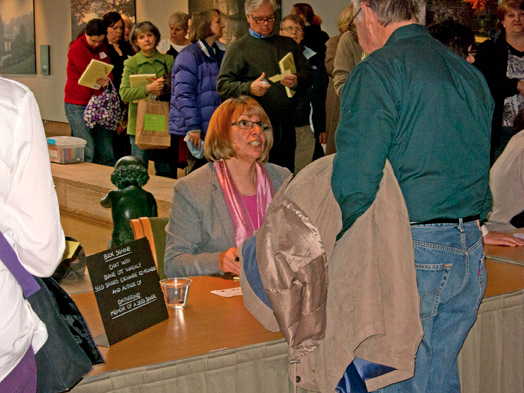Family heirlooms tell a gardening story

Diane Ott Whealy signs copies of her book after a lecture Sunday. Ott Whealy is the founder of the Seed Savers Exchange, one of the largest nonprofit heirloom seed collections in the United States. (Laura Mihelich/MEDILL)
Diane Ott Whealy did not know that her family’s seeds, passed down from generation to generation, would be inspiration for protecting plant diversity. But they became the buds for one of the largest seed collections in the United States.
Ott Whealy is the co-founder of the Seed Savers Exchange, an organization dedicated to collecting seeds for heirloom gardening, a process of naturally growing plants without controlling pollination within a species.
Ott Whealy spoke on Sunday to a packed auditorium of more than 100 people at the Chicago Botanic Gardens in Glencoe about her novel, “Gathering: Memoirs of a Seed Saver,” and the journey towards co-founding Seed Savers.
The lecture kicked off gardening season in Chicago, and opened the Botanic Gardens’ first-ever seed swap.
Heirloom gardening protects genetic diversity in plants, much of which is lost when farmers move toward mass production, cross-breeding species to improve ease and quantity of produce, Ott Whealy said.
John Pederson, spokesman for Seed Savers, said that genetic diversity helps protect the taste and look of produce as well as regional plant history.
“People really enjoy connecting with seeds that have historical and genetic heritage,” Pederson said.
Ott Whealy’s interest in seeds started when she was a child visiting her grandparents’ farm, a place she loved to go and help with plant harvesting and seed collection.
Later in life, when she was married to Kent Whealy, the co-founder of Seed Savers, she wanted to start a garden, and asked her grandfather for seeds from two of her favorite plants on his farm, Morning Glory and Pink Tomato. It was then that she found out her great-grandparents brought the seeds from Bavaria.
“It really felt that the seeds had brought them back to life,” Ott Whealy said.
Not long afterwards, Whealy started wondering if anyone else passed seeds down by generation, so she placed an advertisement in Mother Earth News.
The response was almost immediate. People started sending Ott Whealy their seeds.
Patti McKnight, a Chicago resident and event attendee said that a familial connection to seed heritage was what made Ott Whealy’s story inspiring.
“I had never thought of it in that way before,” McKnight said.
When the seeds started overtaking their house, Ott Whealy and her husband decided to quit their jobs and focus solely on the exchange.
“It had become more than a hobby; it was our life,” she said.
Seed Savers was incorporated as a non-profit in 1975, starting with 29 gardeners.
A few years later, Ott Whealy and her family decided to move the exchange from their homestead in Missouri to a farm in Decorah, Iowa, where Seed Saver’s Heritage Farm is still located today.
Seed Savers now has a collection of over 24,000 types of seeds and 13,0000 members from all over the world.
“There’s lots of choices with heirlooms,” Ott Whealy said, and the best way to preserve their genetic diversity is by planting and harvesting.
Pederson described this process as “participatory preservation.”
“We give out enough [seeds] to make them viable,” he said.
Lisa Hilgenberg, a fruit and vegetable horticulturalist at the Botanic Gardens, said that people are becoming more aware of how easy it is to grow some of their own food, which explains the draw of events such as Ott Whealy’s lecture and the seed swap.
“It’s a way to connect with our heritage and with the earth,” she said. “It’s a spiritual connection.”



